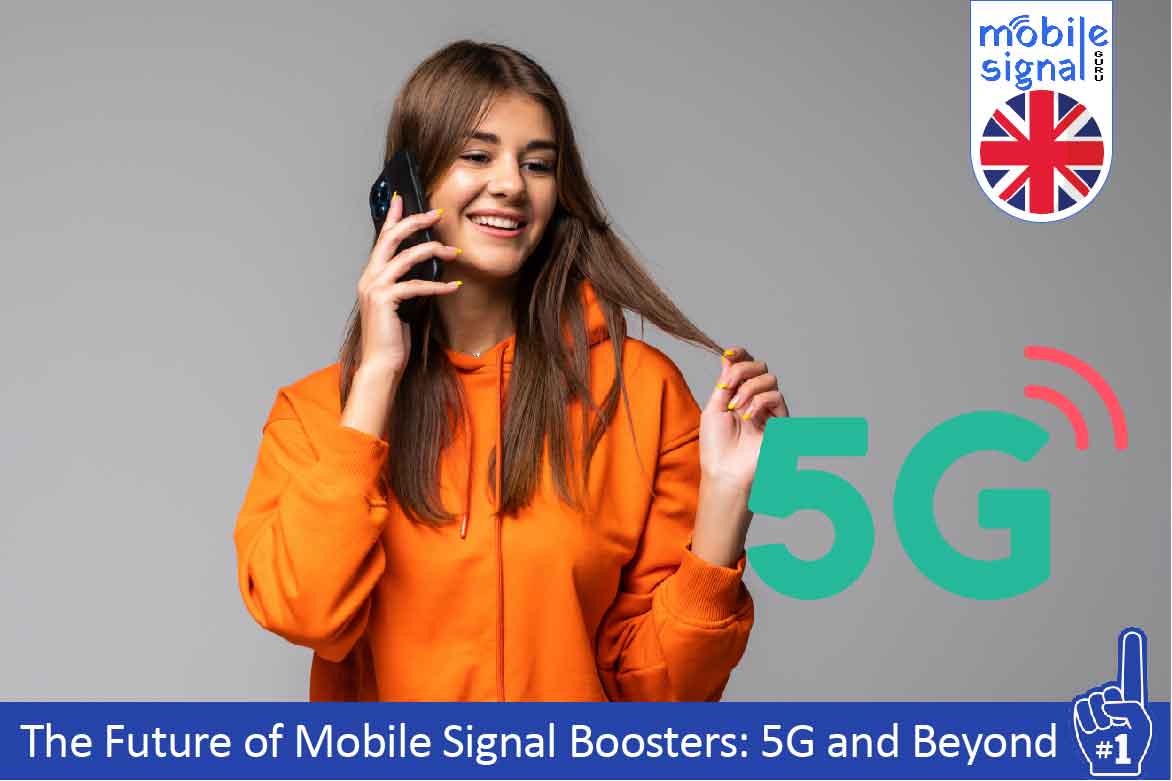As mobile networks evolve, so does the need for better signal quality. In the United Kingdom, mobile signal boosters are already enhancing mobile call quality and data speeds. With the arrival of 5G and future advancements, these boosters are set to become even more important. In this article, we’ll explore how mobile signal boosters are improving the quality of mobile services and what the future holds with 5G and beyond.
What are Mobile Signal Boosters?
Mobile signal boosters are devices designed to amplify weak mobile signals, allowing users to enjoy better connectivity. These devices work by capturing the existing weak signal from a mobile tower, amplifying it, and then rebroadcasting the improved signal inside a building or vehicle.
Signal boosters are especially useful in areas with poor network coverage, like rural areas, remote locations, or large buildings. They are also helpful in urban environments where tall buildings or heavy traffic can block signals.
The Role of Mobile Signal Boosters in Improving Call Quality
Mobile calls can suffer from poor signal strength, leading to dropped calls or poor audio quality. Signal boosters address this problem by improving the signal strength inside buildings. When the signal is stronger, it reduces the chances of call interruptions and improves sound clarity.
- Fewer Dropped Calls: Boosters help reduce call drops, a common issue in areas with weak signal coverage.
- Clearer Voice Quality: Stronger signals mean better audio quality during calls, with fewer distortions.
- Reduced Latency: Boosters minimize the lag between speaking and hearing, which improves real-time communication.
Boosting Data Speeds with Mobile Signal Boosters
Mobile data is a vital part of modern communication. Whether streaming videos, browsing social media, or working from home, data speed matters. In areas with weak signal reception, mobile data speeds can drop significantly. Mobile signal boosters enhance data speeds by amplifying weak signals, allowing users to enjoy faster browsing, downloading, and streaming.
- Faster Downloads: Boosters improve download speeds by providing a stronger signal.
- Better Streaming: With an improved signal, video streaming becomes smoother, with fewer buffering issues.
- Improved Browsing Experience: Websites load faster, making the overall internet experience more enjoyable.
The Evolution of Mobile Networks: From 4G to 5G
The transition from 4G to 5G is set to revolutionize mobile connectivity. 5G offers faster speeds, lower latency, and improved network reliability. This shift will impact the role of mobile signal boosters, requiring them to adapt to the new 5G technology.
What is 5G?
5G is the fifth generation of mobile network technology. It promises speeds up to 100 times faster than 4G, with lower latency and greater network capacity. The network is designed to handle more devices at once, which is essential for the growing number of connected devices, such as smart homes, wearables, and autonomous vehicles.
Why 5G Requires New Signal Boosters
The frequency bands used by 5G are different from those used by 4G. 5G operates on higher frequencies, which can struggle to penetrate buildings and other obstacles. As a result, mobile signal boosters must be updated to handle these new frequencies and ensure consistent, high-quality signal coverage.
The Impact of 5G on Mobile Signal Boosters in the UK
In the United Kingdom, 5G is gradually rolling out, with major cities already covered. The government and mobile network providers are working to expand coverage to more rural areas and improve network performance. As 5G becomes more widespread, mobile signal boosters will play a key role in ensuring that users receive optimal performance, even in areas with weak signal coverage.
5G and Building Penetration
5G’s high-frequency signals are prone to interference and can have difficulty penetrating buildings. This means that people living or working in multi-story buildings, or in areas with a lot of physical barriers, may experience poor 5G coverage indoors. This is where mobile signal boosters come in. By amplifying the 5G signal inside buildings, these boosters will ensure that users can enjoy faster data speeds and better call quality indoors.
5G Coverage in Rural Areas
One of the challenges of 5G deployment is its ability to reach rural areas. 5G infrastructure is expensive to build, and it may take time for rural areas to experience full coverage. However, mobile signal boosters can help bridge the gap. By amplifying existing 5G signals in areas where coverage is limited, boosters can provide an enhanced user experience until full coverage is available.
Beyond 5G: What’s Next for Mobile Signal Boosters?
As mobile technology continues to advance, there’s no telling how far we’ll go. The future of mobile signal boosters goes beyond just 5G. Let’s take a look at what’s next for mobile signal boosters in the years to come.
1. 6G and the Need for Boosters
While 5G is still being rolled out, research into 6G is already underway. 6G promises even faster speeds and lower latency than 5G. It is expected to support advanced technologies like holographic communication, augmented reality, and the Internet of Everything (IoE). As with previous generations, 6G will require updated signal boosters to handle new frequency bands and ensure reliable coverage.
2. Wi-Fi 6 and Mobile Signal Boosters
Wi-Fi 6 is the latest standard for wireless networks, offering faster speeds, more reliable connections, and better performance in crowded environments. As more devices use Wi-Fi 6, the demand for signal boosters that can handle both mobile signals and Wi-Fi signals will increase. Future mobile signal boosters will need to be dual-purpose, boosting both mobile and Wi-Fi signals for a seamless user experience.
3. Smart Signal Boosters
The future of mobile signal boosters will likely include smarter devices. Our smart boosters could automatically adjust to changing network conditions, optimize signal strength, and integrate with other smart home devices. With the rise of smart homes and IoT devices, having a signal booster that can work in harmony with your network will be crucial.
4. Global Connectivity and Mobile Signal Boosters
As the world becomes more connected, global roaming will become more seamless. Mobile signal boosters could be designed to work across different network types and countries, allowing users to enjoy consistent, high-speed data no matter where they are. This will be particularly important for people who travel frequently and need reliable mobile connectivity wherever they go.
Key Benefits of Mobile Signal Boosters
Before we conclude, let’s highlight the key benefits of using mobile signal boosters, particularly with the advent of 5G and beyond:
- Improved Mobile Call Quality: Boosters help reduce call drops and enhance voice clarity.
- Faster Data Speeds: Boosters allow for quicker downloads, uploads, and smoother browsing.
- Better Coverage: Signal boosters improve coverage in remote or rural locations.
- Stronger 5G Signal: As 5G becomes more widespread, boosters will help improve indoor coverage.
- Seamless Connectivity: Future boosters will offer better integration with Wi-Fi and IoT devices.
Conclusion
Mobile signal boosters are already improving mobile call quality and data speeds in the UK. With the arrival of 5G, the importance of signal boosters will only increase. They will play a crucial role in ensuring users have access to fast, reliable mobile services in both urban and rural areas.
As technology evolves, so will the capabilities of mobile signal boosters. From 6G to Wi-Fi 6, and even smarter devices, the future holds exciting opportunities for better connectivity. For now, mobile signal boosters remain an essential tool for anyone who needs consistent and high-quality mobile service, whether at home, in the office, or on the go.
With the right mobile signal booster, you can ensure that you’re always connected, no matter what the future of mobile networks holds.
 Australia (AUD)
Australia (AUD) Denmark (DKK)
Denmark (DKK) France (EUR)
France (EUR) Germany (EUR)
Germany (EUR) Ireland (EUR)
Ireland (EUR) Malta (EUR)
Malta (EUR) Netherlands (EUR)
Netherlands (EUR) New Zealand (NZD)
New Zealand (NZD) Norway (NOK)
Norway (NOK) Spain (EUR)
Spain (EUR) Sweden (SEK)
Sweden (SEK) UAE (AED)
UAE (AED) Global Site (USD)
Global Site (USD)
